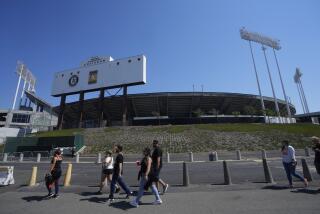Landmark to Sell Prime Real Estate to Private Interests
- Share via
Landmark Land Co., which owns some of Southern California’s premier golf courses, said Wednesday that it has agreed to sell its prime real estate for as much as $937 million to private interests, including its senior management and investors from Japan.
If the sale goes through, it would mark yet another major Japanese investment in prime golf courses in the United States. Japanese investors already own the Riviera Country Club in Los Angeles and the famous Pebble Beach course on the Monterey Peninsula.
The proposed sale--the second of its kind tried in the past nine months--was greeted with deep skepticism by Wall Street investors, who sent Landmark Land’s stock plunging. The firm’s shares fell $1.125 a share to close at $7 on the American Stock Exchange.
A key part of the deal calls for the sale to be 60% financed by New Orleans-based Oak Tree Savings Bank, a money-losing financial institution owned by Carmel-based Landmark.
“This deal is another joke,” said Tom Barton, a partner in the Dallas office of Feshbach Bros., an investment firm that specializes in betting stocks will go down in value, a practice known as selling short. “Sixty percent financed by Oak Tree? That’s not a sale.”
Landmark officials declined to elaborate on their announcement, which identified the latest buyers as a joint venture led by Tokyo-based Daiichi Real Estate that also included Landmark Chairman Gerald G. Barton.
A similar deal last April to sell Landmark’s prime assets to Orange County developer Barry G. Hon for $967 million eventually collapsed after federal banking regulators objected to Oak Tree’s key role in the financing. Oak Tree was to finance approximately 75% of that sale.
The sale announced Wednesday is a two-step deal that calls for Landmark to sell its best properties--which include the La Quinta, Mission Hills and PGA West golf courses in the Palm Springs area--for $739 million. A second phase includes options to sell another group of lower-profile properties for $198 million.
The sale must be approved by company shareholders as well as the Office of Thrift Supervision and other bank supervisory agencies. “There is no assurance . . . that the transaction will be consummated,” Landmark said in a press release.
If the sale does go through, the new owners will be a consortium of foreign investors led by Daiichi Real Estate, a major real estate firm in Japan. Barton and two of his senior executives were also named as part of the investment group.
Though regulators declined comment on the latest sale attempt, one government official said that he personally was not impressed. “This does not seem to be much different than the Barry Hon deal,” said the official, who asked not to be identified.
Some investment experts, however, believe that federal banking regulators may approve the sale this time around, simply because the terms may be the best that Oak Tree Savings, reeling from heavy losses, can obtain in a depressed real estate market.
“It may pass muster,” said Kenneth D. Campbell, president of Audit Investments, an investment advisory firm in Montvale, N.J.
Oak Tree Savings ran into trouble in 1989 after Congress passed tough bailout legislation for the savings and loan industry. The law forced Oak Tree and other thrifts to sell their real estate developments to bolster their capital.
Earlier this week, Oak Tree said it was going to add $224 million to its reserves to handle problem assets. With Oak Tree Savings as its principal subsidiary, Landmark has lost $91 million in the first nine months of 1990.
More to Read
Inside the business of entertainment
The Wide Shot brings you news, analysis and insights on everything from streaming wars to production — and what it all means for the future.
You may occasionally receive promotional content from the Los Angeles Times.










